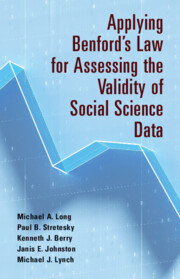Book contents
- Applying Benford’s Law for Assessing the Validity of Social Science Data
- Applying Benford’s Law for Assessing the Validity of Social Science Data
- Copyright page
- Contents
- Figures
- Tables
- Preface
- Acknowledgments
- Chapter 1 Introduction
- Chapter 2 Validity and Self-Reported Data
- Chapter 3 Benford’s Law and Assessing Conformity
- Chapter 4 Data Characteristics and the Workflow of Benford Agreement Analysis
- Chapter 5 Benford Agreement Analysis of the Sea Around Us Project’s Fish-Landings Data
- Chapter 6 Benford Agreement Analysis of US and Global COVID-19 New Cases Data
- Chapter 7 Assessing the Impacts of Problematic Benford Validity
- Chapter 8 Conclusion
- References
- Index
Chapter 2 - Validity and Self-Reported Data
Published online by Cambridge University Press: 09 November 2023
- Applying Benford’s Law for Assessing the Validity of Social Science Data
- Applying Benford’s Law for Assessing the Validity of Social Science Data
- Copyright page
- Contents
- Figures
- Tables
- Preface
- Acknowledgments
- Chapter 1 Introduction
- Chapter 2 Validity and Self-Reported Data
- Chapter 3 Benford’s Law and Assessing Conformity
- Chapter 4 Data Characteristics and the Workflow of Benford Agreement Analysis
- Chapter 5 Benford Agreement Analysis of the Sea Around Us Project’s Fish-Landings Data
- Chapter 6 Benford Agreement Analysis of US and Global COVID-19 New Cases Data
- Chapter 7 Assessing the Impacts of Problematic Benford Validity
- Chapter 8 Conclusion
- References
- Index
Summary
Here we develop a discussion of the concept of validity in the social sciences. We first highlight the history of validity and how it has been conceptualized and measured over time. Next we discuss a type of social science data that is often overlooked in the validity measurement and assessment literature: data that are based on self-reporting. Despite the widespread use of self-reported data in various social science disciplines such as economics, political science, and sociology, there are still few reported attempts to check data accuracy. By way of giving examples, we overview self-reported data in four areas: (1) US prison population data, (2) COVID-19 case data, (3) toxic releases, and (4) fish landings. We then discuss the need for a tool and for an established workflow for assessing the accuracy and validity of quantitative self-reported data in the social sciences. We suggest that applying Benford’s law to these types of data can provide a measure of validity assessment for data that would otherwise not be assessed for accuracy; then we briefly introduce the concept of Benford validity. We conclude the chapter with a short review of existing studies that have applied Benford’s law to social science data in some manner.
- Type
- Chapter
- Information
- Publisher: Cambridge University PressPrint publication year: 2023

